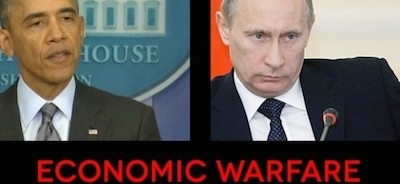Gold Bounces As Ukraine Crisis Escalates
John Kerry and other U.S. officials and once again banging the war drums. In the most recent comments, Kerry said that the United States is “ready to act against Russia.” The truth is that the U.S. has been acting against Russia for quite some time in various ways. The implication here is that the U.S. government in now ready to act militarily, however subtly it may have been stated. To get an idea of just how quickly the conflict has been escalating, here are some of the headlines from the past week alone:
- Kerry: We Are Ready To Act Against Russia
- Russian Warplanes Repeatedly Enter Ukraine Airspace; Helicopter Buildup By Latvia Surges
- Treasury Secretary Lew Warns Russia: “Take A Step Back… Or Pay The Price”
- U.S. Navy Sends Second Warship to Black Sea along with 600 troops to Easter Europe
- Pentagon mulls deployment as Poland asks for 10,000 troops
- Russia ‘Wants To Start World War III’: Ukrainian PM Yatsenyuk
- Kerry to Putin: ‘Window to Change Course Closing’
- Russian Troops Testing Ukraine Border: Officials
- France Sending Fighter Jets to Secure Baltic
- Russia ‘Forced’ to Start New Drills After Ukraine’s ‘Anti-Terror’ Drive
- More Sanctions ‘Teed Up’ for Russia, Warns Obama
- Ukraine army launches next stage of military op ‘to isolate Slavyansk’
- Ukrainian military helicopter shot down at Kramatorsk airfield in eastern Ukraine
- Ukraine Warns Putin “We Will Eliminate Invaders” After Pro-Russian Forces Down Ukraine Chopper
- Gazprom Turns Up Heat on Kiev With $11 Billion Bill
On the positive side of things, Obama says: “I would ‘absolutely’ save Putin from drowning.” Good to know, but you might want to put a leash on your overly zealous secretary of state that is threatening military action against a nuclear-armed Russia. Otherwise, we may all face the possibility of drowning in a sea of radiation.
 There is no justification for the United States to be interfering in the internal affairs of Ukraine or Russia. We are antagonizing a nation with a formidable military and newfound wealth via growing energy exports. Digging deeper, it seems clear that the U.S. involvement is nothing more than geopolitical positioning and a desperate attempt to save the world reserve petrodollar.
There is no justification for the United States to be interfering in the internal affairs of Ukraine or Russia. We are antagonizing a nation with a formidable military and newfound wealth via growing energy exports. Digging deeper, it seems clear that the U.S. involvement is nothing more than geopolitical positioning and a desperate attempt to save the world reserve petrodollar.
Russia, China and other BRICS have been moving to abandon the dollar in international trade. There are plans for a massive $30 billion oil pipeline from Russia through China to India that could shift the geopolitical balance of power in the world.
Back in the U.S., Treasury bond auctions are failing to attract foreign buyers, leaving the FED as the buyer of last resort. Put in laymen’s terms, nobody want to buy U.S. debt anymore and the financially insolvent government must now rely upon debt monetization by the Federal Reserve in order to continue functioning. In essence, they are stealing wealth from dollar holders around the globe in order to continue with an insanely-bloated military budget and kickbacks for their political donors.
There isn’t too much that U.S. citizens can do about this theft, other than renouncing citizenship and moving abroad. But sovereign nations around the globe are no longer putting up with it. They are publicly discussing dumping their U.S. debt and dollar holdings in favor of gold, amongst other assets. They are also trading in local currencies, decreasing the global demand for Federal Reserve notes.
The U.S. may have been able to squash this threat to the petrodollar’s reserve status by attacking Iraq and Libya when they started trading oil outside of the dollar or discussing a gold-backed currency. But there are limits to the military dominance of the United States and chicken-hawk politicians are now finding this out via the confrontation with Russia. Bullying tactics will also not work on China or a growing list of other nations that are no longer willing to cowtow to U.S. military might.
Further damaging the standing of the United States in the eyes of the world were the revelations of the NSA spying scandal by Edward Snowden. Apparently, even allies have a limited tolerance when their personal phone conversations are being recorded by U.S. government agencies. Once the envy of the world, there is now a growing perception of the U.S. as a bullying, hypocritical superpower skirting international law and order for their own benefit. Unfortunately, this criminal element within the U.S. government appears to be increasingly desperate to hold onto their power and willing to risk war with nuclear-armed nations in order to keep the banking system afloat and the benefits of being able to print the world reserve currency intact.
Anyone studying international politics or contemplating how to best allocate assets has to consider just how serious the implications would be if the rest of world stopped using dollars and stopped buying U.S. debt. In the short-term, how will the dollar and stock market react to an escalation of the conflict between the United Stats and Russia?
Nuclear deterrence worked well during the Cold War for fear of mutually-assured destruction. Has anything changed? Would the U.S. really launch a military attack against Russia? Could a minor miscommunication, rogue agent or unforseen accident plunge the human race into another world war? Would both sides restrain from using nuclear weapons?
In addition to a series of toothless sanctions, the rating agency S&P downgraded Russia to just above junk status this week. In response, Russia has proposed what amounts to all-out economic warfare against NATO countries. ZeroHedge reports:
Ahead of yet another round of western sanctions which appears imminent unless Obama is to look even more powerless than he currently is (granted, a difficult achievement), Russian presidential adviser Sergei Glazyev proposed plan of 15 measures to protect country’s economy if sanctions applied, Vedomosti newspaper reports, citing Glazyev’s letter to Finance Ministry. According to Vedomosti as Bloomberg reported, Glazyev proposed:
- Russia should withdraw all assets, accounts in dollars, euros from NATO countries to neutral ones
- Russia should start selling NATO member sovereign bonds before Russia’s foreign-currency accounts are frozen
- Central bank should reduce dollar assets, sell sovereign bonds of countries that support sanctions
- Russia should limit commercial banks’ FX assets to prevent speculation on ruble, capital outflows
- Central bank should increase money supply so that state cos., banks may refinance foreign loans
- Russia should use national currencies in trade with customs Union members, other non-dollar, non-euro partners
Whether the conflict escalates solely via economic means or turns into physical warfare, investors are likely to flee to safe-haven assets such as precious metals. Gold and silver prices have been very volatile thus far in 2014. After an initial rally from $1,200 to around $1,400, gold has since given back half of the gain. The metal was slammed down yesterday to $1,270 briefly, but quickly bounced back above $1,300. There appears to be strong buying support around $1,300 and I continue to believe that any dip towards $1,200 would be short-lived.

The silver slamdown and recovery was even more pronounced, with the price dipping below $19 before recovering back to towards $20.

The longer-term chart remains bullish for silver as support at $19 has held on four occasions in the past year. The price is below the key moving averages, but a general trend of higher lows has been established and the RSI is pointing higher with plenty of room to run. This appears to be an excellent entry point for long-term investors.

Lastly, gold mining stocks remain severely oversold and undervalued relative to the metal. After a bounce in early 2014, the HUI/Gold ratio is back to 0.17. This represents how much gold you could buy with one unit of the HUI Gold Bugs Mining Stock Index and the ratio is roughly half of the average level seen since the start of the gold bull market in 2001.

In other words, there appears to be significant upside potential in gold stocks with limited downside risk at current prices. With several mining companies suspending operations due to the low gold prices, supplies should drop and force prices back higher over the next few years.
In my view, precious metals appear to be one of the only asset classes that is not currently overvalued. Stocks, real estate, bonds and just about every other asset class looks to be in bubble territory by most measurements.
By contrast, quality mining stocks with low costs, high growth profiles, strong management and stable political jurisdictions look incredibly undervalued. They are trading at a fraction of their previous highs and at their lowest levels relative to gold since the start of this bull market. Even a moderate rise in the prices of gold and silver should send many of these stocks soaring. If the crisis in Ukraine continues on the current path of escalation, we are likely to see continued weakness in the stock market and much higher prices for gold, silver and the companies that mine these metals.
I am hopeful that cooler heads with prevail and a military conflict with Russia will be avoided. However, I believe it makes sense to hope for the best and prepare for the worst. And regardless of what happens in the current conflict over Ukraine, the fundamentals for gold and silver remain bullish. Increasing debt levels, runaway spending, money printing, quantitative easing, growing demand from China and several other factors are likely to push prices much higher in the coming years.
********
No matter what happens, I wish you happiness and prosperity in the new year! If you would like to receive my monthly contrarian newsletter, which covers precious metals, agriculture, energy, emerging technologies and so much more, please click here to subscribe.



















